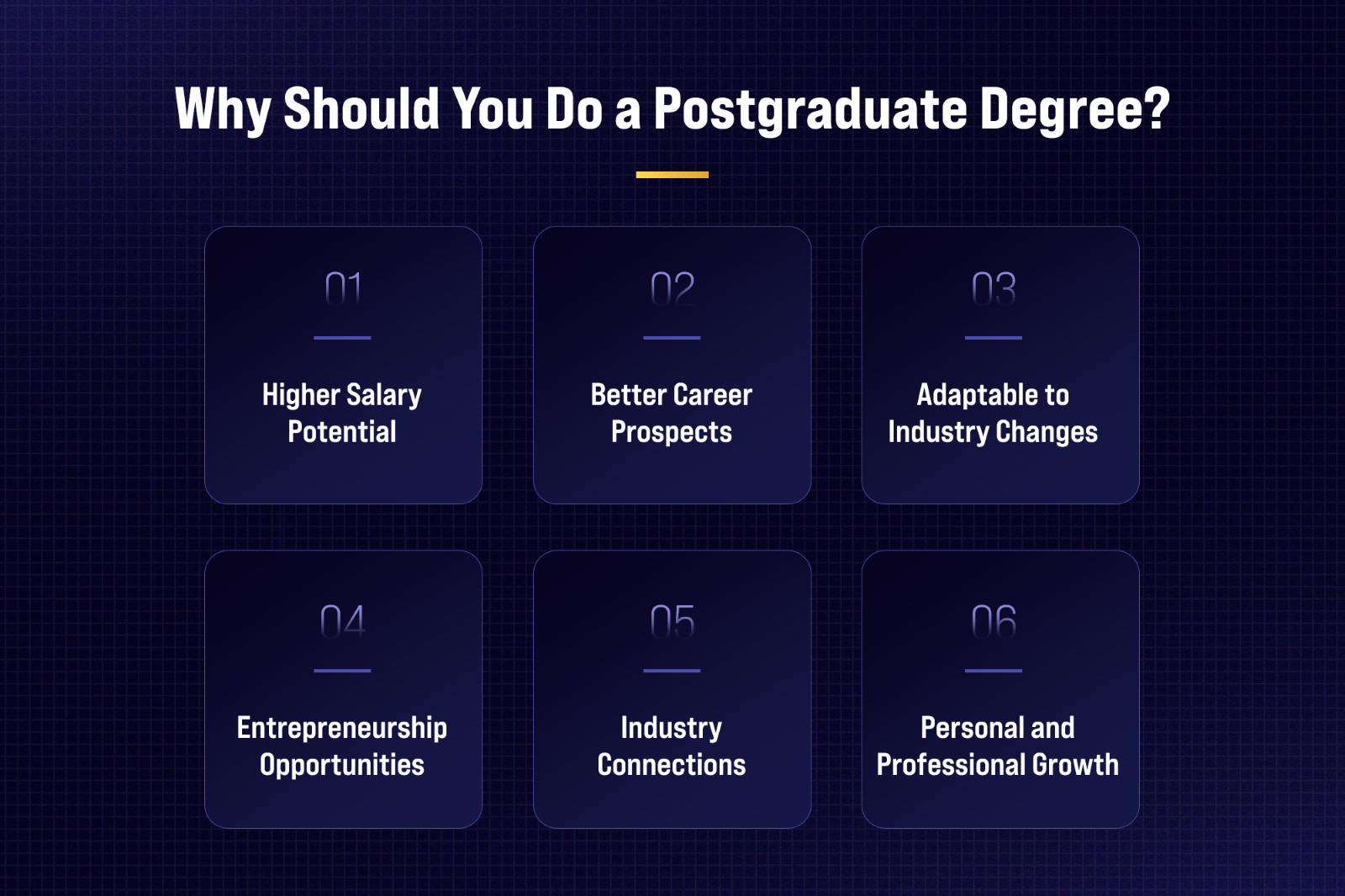MTech vs MBA: Which is Better After Engineering?

After earning an engineering degree, graduates often face a pivotal moment filled with diverse career paths While some graduates prefer to enter the workforce immediately, many opt for further education to enhance their skills in the technical domain with an MTech or explore the world of business and management with an MBA.
Both degrees offer excellent career prospects, but the right choice depends on individual career goals and interests, as it will cater to different career aspirations. In this article, we will analyze the differences, advantages, and key factors to consider when deciding between MTech and MBA after engineering.
Why Should You Do a Postgraduate Degree?

After engineering, it is not mandatory to pursue a postgraduate degree, but it can significantly impact your career growth. In an increasingly competitive job market, higher education helps professionals stand out, gain specialized knowledge, and unlock better opportunities. Here are some significant reasons why pursuing a master's degree, whether MTech or MBA, can transform your future:
- Higher Salary Potential: One of the most compelling reasons for getting a postgraduate degree is the potential to earn higher salaries. Research indicates that those with a master’s degree generally command significantly higher salaries compared to their undergraduate counterparts. Specializing in a field makes you more valuable to companies and increases your chances of landing high-paying jobs.
- Better Career Prospects: A master’s degree can open doors to senior positions that may not be accessible with just an engineering degree. It allows you to move beyond entry-level jobs and qualify for managerial, executive, or research-oriented roles. Whether you choose MTech for advanced technical expertise or MBA for leadership skills, a postgraduate qualification helps accelerate your career growth.
- Adaptable to Industry Changes: Technology and modern businesses are evolving rapidly. Professionals who keep upgrading their skills are more likely to stay relevant and in demand. An MTech helps engineers deepen their technical expertise, while an MBA equips professionals with business acumen, strategy, and leadership skills, which ensures that they remain competitive in the job market.
- Entrepreneurship Opportunities: If you aspire to launch your own startup or business, a postgraduate degree can provide the right foundation. An MBA teaches business development, financial management, and marketing strategies, while an MTech can help you develop innovative tech solutions for modern problems.
- Industry Connections: Postgraduate programs offer valuable opportunities to connect with industry experts, mentors, and like-minded professionals. Whether through alumni networks, internships, or corporate partnerships, these connections can lead to better job placements, collaborations, or entrepreneurial ventures.
- Personal and Professional Growth: Apart from professional growth, a master’s program fosters personal growth. It enhances problem-solving abilities, decision-making skills, and confidence, making you more adaptable to challenges in the professional world.
MTech or MBA: What are the Differences?
Criteria | MTech | MBA |
Nature of Study | Advanced technical specialization focusing on engineering principles, research, and innovation. | Broad management education emphasizing leadership, strategy, finance, marketing, and overall business administration. |
Entrance Exams | Entry into these programs often mandates clearing standardized tests like GATE, JEE Advanced, or BITSAT, varying by institution and field. | Admissions require exams like CAT, CMAT, NMAT, or MAH-MBA CET, along with other institute-specific tests. |
Focus Areas | Deep dive into technical subjects such as AI, cybersecurity, mechanical, electronics, civil, or other specialized engineering domains. | Comprehensive study of business functions including finance, operations, human resources, marketing, international business, and entrepreneurship. |
Industry Relevance | Highly regarded in sectors like R&D, industrial production, technology, engineering, and government enterprises. | In demand across diverse sectors that require strong management and business acumen, from multinational corporations to startups and consulting firms. |
Career Opportunities | Careers in R&D, technical consultancy, academia, product design, engineering development, and roles in tech-centric companies like IT, electronics, construction, or aerospace. | Managerial, consulting, executive, and entrepreneurial roles in various sectors such as finance, digital marketing, IT management, healthcare, and global business. |
Financial Considerations | Generally lower tuition fees compared to MBA programs; financial returns are realized over time through specialized technical roles and research positions. | Typically involves a higher financial investment; however, graduates often experience rapid ROI with higher salary packages and leadership roles. |
Personal Aspirations | Best suited for individuals passionate about technical innovation, deep research, and becoming subject matter experts in their engineering domain. | Ideal for those aiming to transition into leadership roles, manage business operations, or pursue entrepreneurial ventures in the corporate world. |
Pros and Cons of Doing an MBA After Engineering

Combining an MBA with an engineering background merges technical proficiency with strategic thinking, opening doors to executive, administrative, and startup ventures. However, before deciding, you must evaluate the benefits and drawbacks to determine whether it caters to your long-term career goals.
Advantages
Better Job Prospects
An MBA after engineering adds valuable business and leadership skills to your technical knowledge. Employers value professionals who can combine technical expertise with managerial skills, making you a highly sought-after candidate in sectors like consulting, finance, IT management, and operations.
Leadership Skills Development
A major focus of an MBA program is leadership training. The curriculum is designed to nurture leadership qualities by improving strategic thinking, problem-solving, decision-making, communication, and teamwork. Such competencies are crucial for climbing the corporate ladder and securing top-tier management roles
Career Switch Opportunities
If technical roles don't align with your long-term career goals, an MBA will help you shift into management, finance, marketing, consulting, or entrepreneurship. After obtaining an MBA, many engineers pursue careers in finance, investment banking, real estate, and corporate strategy.
Higher Salary Potential
On average, an MBA graduate earns significantly higher salaries than someone with only a technical engineering degree. Since businesses value professionals who can bridge the gap between technology and management, MBA graduates with an engineering background often secure high-paying roles in strategy, consulting, and executive leadership.
Global Career Scope
An MBA makes it easier to work in multinational corporations (MNCs) and international markets since it is a globally recognized and sought after degree. Many MBA graduates move to global roles in business strategy, operations, finance, and analytics, offering a competitive edge in the global job market.
Disadvantages
High Financial Investment
Pursuing a full-time MBA, especially from a top-tier business school, requires a significant financial investment. Moreover, according to MBA Universe there has been a constant annual increase of 5-10% in MBA fees in the last few years. Hence, many students find it challenging to fund their MBA education.
While scholarships and education loans are available, not everyone is eligible for them, and without a guaranteed return on investment (ROI), their financial burden can become even greater.
Time-Consuming
An MBA program typically lasts 2 years (full-time) and requires students to prepare for entrance exams (CAT, CMAT, NMAT, etc.) as well as the admission process (interviews, group discussions, etc.). If opting for an executive MBA, it requires at least 5 years of work experience, further delaying career progression. Thus, the time investment is high, making it a costly decision in terms of opportunity cost.
Unpredictable Returns on Investments (ROI)
The ROI of pursuing an MBA degree depends on the credibility of the university you choose. While Tier 1 colleges in India are known for greater returns through higher salaries, attending a low-tier business school can lead to below average placements and salaries.
Many MBA graduates also remain unemployed due to the credibility of their college; thus, getting admission into top-tier institutions like IIMs, ISB, XLRI, or global B-schools remains crucial for an MBA to hold real value.
Pros and Cons of Doing MTech After Engineering
Pursuing a Master of Technology (MTech) after completing an engineering degree makes the most sense for students who wish to gain specialized knowledge, enhance career prospects, and delve into research. Yet, this path isn’t without its unique pros and cons.
Advantages
Specialized Knowledge
One of the biggest advantages of an MTech degree is gaining in-depth knowledge and expertise in a specific field of engineering. Unlike a general engineering degree, a master's program focuses on advanced concepts, practical applications, and industry-specific technologies, helping students become specialists in their domain.
Career Advancement
Employers frequently prioritize candidates with higher education for niche, research-oriented, and leadership positions. An MTech degree can improve career prospects, making it easier to move into senior positions in industries like technology, manufacturing, academia, and research.
Higher Earning Potential
Data shows that individuals holding a master’s degree typically outearn those with only an undergraduate qualification. This can make the financial investment in higher education worthwhile, especially in technical fields where specialization is valued.
Research and Innovation Opportunities
MTech curricula often incorporate thesis work, enabling students to pioneer innovations in their field. Those interested in R&D, patents, and innovation will find MTech valuable, as it enables them to develop new technologies, solve industry problems, and publish research papers.
Disadvantages
Changing Career Goals
Your career aspirations might evolve over time, and the specialization chosen for an MTech degree might not align with future job opportunities or interests. This makes it important to carefully evaluate long-term goals before committing to a specialized master's program.
High Financial Investment
Pursuing a master's degree can be expensive, with costs including tuition fees, opportunity costs, and living expenses. Despite the availability of financial support mechanisms, scholarship accessibility remains selective, necessitating a comprehensive return on investment analysis.
Uncertain Return on Investment
While an MTech degree increases earning potential, job market competition can make it challenging to secure high-paying jobs immediately after graduation. The actual value of the degree depends on practical exposure, internships, and industry connections, rather than just academic knowledge.
Factors to Consider when Choosing Between an MBA and MTech
While both degrees offer excellent career opportunities, choosing between an MBA and an MTech caters to different skill sets, industries, and professional goals. Navigating this critical career junction requires a holistic evaluation of multiple interconnected factors.
Career Goals and Interests
- MBA: If you are interested in management, leadership, business strategy, or entrepreneurship, an MBA is the right choice. It equips you for opportunities in sectors like banking, sales, advisory, logistics, talent management, and C-suite roles.
- MTech: If you are passionate about engineering, research, innovation, and technical expertise, an MTech is the better option. It helps in advancing knowledge in fields like AI, machine learning, mechanical design, data science, and other specialized areas of engineering.
Industry and Market Demand
- MBA: Sectors like banking, finance, IT management, marketing, operations, and consulting prefer MBA graduates. It is ideal for those who want diverse career opportunities and roles that require business acumen.
- MTech: Industries such as research & development, core engineering, manufacturing, IT product development, and academia value MTech graduates. If you want to work on cutting-edge technology and product innovation, this path is suitable.
Skill Set and Strengths
- MBA: Focuses on communication, leadership, strategic thinking, decision-making, networking, and financial management. If you excel in communication and analytical thinking, an MBA could be your ideal next step.
- MTech: Involves technical problem-solving, coding, research, logical thinking, and analytical skills. If you enjoy working on technological advancements, designing solutions, and scientific research, an MTech is the right fit.
Financial Investment and Return on Investment (ROI)

- MBA: Typically costs more, with fees ranging from ₹8 to ₹25 lakh for top-tier business schools like IIMs, XLRI, ISB, etc. However, MBA graduates often get higher salary packages and leadership positions, offering a strong ROI.
- MTech: It is generally more affordable, with average fees of ₹3 lakhs, especially in government institutions like IITs and NITs. However, salary growth may be slower compared to an MBA unless you pursue research or work in high-paying industries like AI and data science.
Time Commitment and Program Duration
- MBA: A full-time MBA takes two years to complete, while executive or part-time MBAs take an average of 1 to 1.5 years (usually for professionals with experience).
- MTech: Typically takes two years to complete, with some specializations requiring more time for research and thesis work.
In the end, your choice should reflect your interests, professional objectives, economic circumstances, and industry dynamics. Take time to analyze your strengths and goals before choosing between the two degrees.
The Altera Institute’s PGP as an Alternative
Traditional MBA programs from low-ranking colleges often yield uncertain returns, while only Tier-1 B-school graduates secure the best opportunities. Moreover, gaining admission to these top institutions is highly competitive. Hence, for those seeking a high-impact, industry-relevant education, Altera Institute’s PGP in Applied Marketing provides a specialized and practical alternative.
Differing from conventional MBAs, this accelerated 15-month PGP course is crafted by top executives from companies like HUL, Mamaearth, and Reckitt, guaranteeing relevance to modern business challenges. Taught exclusively by seasoned CXOs, it emphasizes hands-on experience through:
- Real-world case studies, interactive simulations, and collaborative projects with brands like TheWholeTruth Foods, Bombay Shaving Co., and Pilgrim.
- Real-world business insights from top executives across 20+ renowned organizations.
- Guaranteed industry exposure leading to placements in high-growth companies like Godrej, Himalaya, Blinkit, and Mamaearth.
By prioritizing practical application over theoretical learning, Altera Institute bridges the industry-academia gap, offering a clear ROI path for professionals aiming for digital-first marketing careers.
FAQ
Q1. Is MTech better than MBA?
Ans: The choice between MTech and MBA depends on individual career goals. MTech is ideal if you want to specialize in technical fields, pursue research, or work in R&D roles. An MBA aligns better with aspirants targeting corporate governance, operational control, or entrepreneurial endeavors.
Hence, neither of the two degrees is considered to be universally better than one another, as it depends on your aspirations and industry preferences.
Q2. Does an MTech degree increase salary opportunities?
Ans: Yes, an MTech degree can lead to higher salaries, especially in specialized technical roles, research positions, and academia. However, salary growth also depends on factors such as industry demand, experience, and the institution from which you earn your degree.
Q3. Should I pursue both an MTech and an MBA degree?
Ans: Pursuing both an MTech and an MBA is uncommon and usually unneeded unless you have specific career objectives that necessitate expertise in both technical and managerial disciplines. If you are passionate about technology and want to advance to leadership or business roles, gaining job experience after MTech and then completing an executive MBA could be a good strategic approach.
Conclusion
Choosing between MTech and MBA after engineering is a significant decision that depends on your career aspirations, skills, and industry preferences. Both degrees offer unique advantages and cater to different professional goals, so it’s essential to evaluate factors like market demand, financial investment, and personal interests before making a choice.
Career trajectory rarely follows a universally applicable linear progression. Hence, the best decision is one that aligns with your strengths, long-term vision, and the opportunities you want to pursue. By meticulously evaluating your aspirations and market realities, you can chart a course toward a rewarding and dynamic professional journey.





